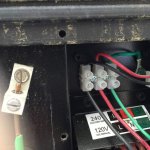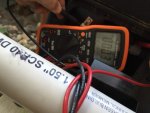Hi I am about to move a pool light switch from one location to another on my outside wall. I noticed that my electrical contractor had bounded the switch, the box and the breaker box with a 8 gauge cooper wire coming from the Pentair Junction Box out in the yard. I ran a continuity test with my multimeter and everything is bonded together, the light, switch, ladder, diving board, the pump, the heater and the main breaker box. The hot and neutral wires on the switch are GFCI protected.
I guess my question is that I have never seen any pictures showing the Main Breaker being bonded with the pool. It sort of scares me that I am giving electricity (a short anywhere inside the house) a way around the GFCI protected devices (everything that is near the pool).
I am feeling a little better because I opened up my heater and noticed that electricity could follow the bonding lug to the grounding wire (and that is how it was designed). So even if I did remove the bonding from the switch, the breaker would still be in the bonded.
Thoughts and thanks for your help -
Roger
I guess my question is that I have never seen any pictures showing the Main Breaker being bonded with the pool. It sort of scares me that I am giving electricity (a short anywhere inside the house) a way around the GFCI protected devices (everything that is near the pool).
I am feeling a little better because I opened up my heater and noticed that electricity could follow the bonding lug to the grounding wire (and that is how it was designed). So even if I did remove the bonding from the switch, the breaker would still be in the bonded.
Thoughts and thanks for your help -
Roger



